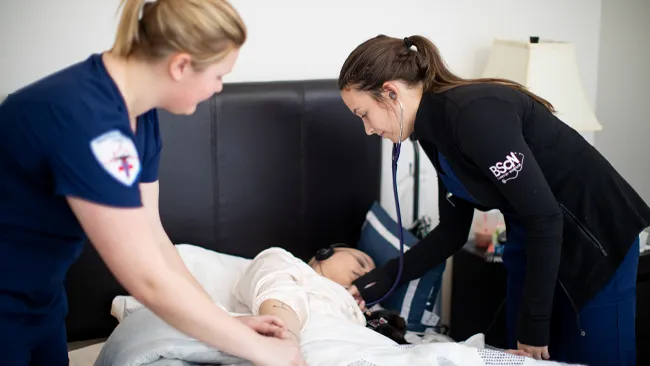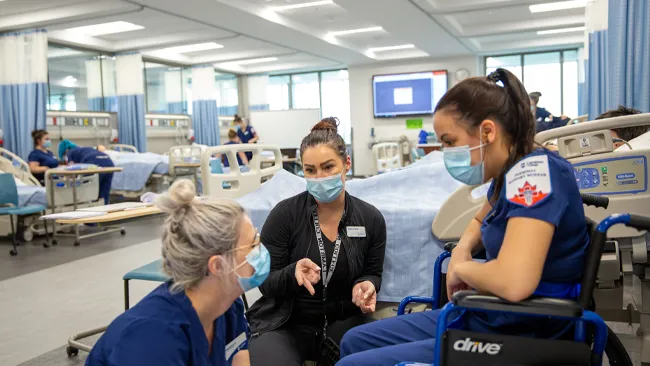

Interprofessional Practice - Gerontology
Overview
Canada's aging population is rapidly growing and requiring specialized services and supports. In this program, students gain the knowledge and skills needed to care for aging adults.
The Lambton College Interprofessional Practice - Gerontology, Ontario College Graduate Certificate focuses on preparing graduates to work interprofessionally to enhance their professional practice to care for aging adults and families who require complex and/or long-term care within institutions or in the home in Canada. In the program, students develop skills in collaborative patient-centred care and inclusive practice.
Program curriculum includes comprehensive patient assessment and team approaches to client and family centric care planning and delivery. Students also study various age-related changes in social, psychological and biological functions to evaluate the implications of these changes on individuals' ability to interact with their social and physical environments and on individuals' care needs.
As a culmination of program learning, students participate in both an interprofessional field placement within a community organization as well as a Work Integrated Learning Project. Program curriculum along with real world experiences prepares graduates for employment in a range of Canadian work settings including senior centres, day and leisure programs, research and education services, retirement homes, long term care homes, group homes and home support services.
Why our Program is Unique
Admission Requirements
- A university degree in a health related field
The admissions process is competitive and meeting the minimum academic requirements does not guarantee admission.
Lambton College reserves the right to alter information including admission requirements and to cancel a program or course at any time; to change the program curriculum as necessary to meet current competencies or changes in the job market; to change the pathways to third-party certification bodies; or to withdraw an offer of admission both prior to and after its acceptance by an applicant or student because of insufficient applications or registrations or over-acceptance of offers of admission. In the event Lambton College exercises such a right, Lambton College's sole liability will be the return of monies paid by the applicant or student to Lambton College.English Language Requirements
- IELTS of 6.5
- or -
- TOEFL iBT 79
- or -
- Passed Lambton Institute of English placement test
Meeting the minimum English requirements does not guarantee admission. Students with higher English proficiency scores will receive priority in the admission assessment process.
Costs
- Term 1 $9,230.67
- Term 2 $8,444.57
- Term 3 $9,144.57
- Term 4 $3,826.64
Total Cost of Program
Tuition fees are estimates and are subject to change each academic year. Fees do not include books (unless specifically noted), supplies or living costs.
Lambton College reserves the right to alter information including admission requirements and to cancel at any time a program or course; to change the location and/or term in which a program or course is offered; to change the program curriculum as necessary to meet current competencies or changes in the job market; to change the pathways third-party certification bodies; or to withdraw an offer of admission both prior to and after its acceptance by an applicant or student because of insufficient applications or registrations or over-acceptance of offers of admission. In the event Lambton College exercises such a right, Lambton College’s sole liability will be the return of monies paid by the applicant or student to Lambton College.
Additional Fees
-
Textbooks$300.00
-
CPR & First Aid$165.00
-
Mask Fit Testing$40.00
-
Name Tag$15.00
-
Uniforms (2)$100.00
-
Duty Shoes$100.00
-
Vulnerable Sector Police Records Check (every 6 months)$40.00
-
Passport to Placement$33.00
-
Immunizations (dependant on number required)$150.00
Travel Expenses
Students are responsible for all costs associated with traveling to clinical placements.
Important Dates, Deadline & Late Fees
For additional information on registration dates, deadlines and late fees please refer to Registration Dates and Deadlines.
Student Fees
A student services fee is included in your tuition.
Health Insurance Coverage
Emergency medical insurance is mandatory for all international students at Lambton College. This includes students who are full-time and part-time and who are on a co-op. This insurance is provided by GuardMe - a third party insurance provider.
See Insurance Costs & DetailsTechnology Requirements
In order to keep pace with the requirements of each and every course in your program, Lambton College requires that each student have access to a laptop while studying at our college.
Labs & Facilities
Courses
Patient & Family Centred Care
Patient Safety
Ensuring patient safety and healthcare quality is critical to everyone in healthcare practice. This course provides healthcare professionals with the knowledge, skill and systems thinking needed to lead the implementation of effective quality and patient safety programs. Learners will examine evidence informed, best practices and elements needed to create a culture of safety and one that engages patients in patient safety. Topics also focus on concepts of human factors, technology, medical errors and the standards and organizational practices which govern quality, safety and risk management in health care today.
Evidence Based Practice
This course focuses on the research process and the analysis and evaluation of research to integrate the best evidence into practice. Learners will gain an understanding of health research evidence and strengthen their research knowledge and skills in order to make informed decisions in their practice. These skills include the ability to understand and interpret research literature and the capacity to translate this knowledge to support and inform practice innovations.
Interprofessional Practice - A Canadian Perspective
This course introduces students to key concepts of interprofessional collaboration within Canada, with a focus in gerontology. Learners gain an understanding of various health and social service professions in terms of roles, responsibilities, and competencies. Through self-reflection, students develop an awareness of professionalism and principles of effective team functioning as key components for interprofessional and ethical behaviour. Students participate in activities that incorporate principles of collaborative leadership and conflict resolution that foster a coordinated approach to shared decision making.
The Aging Population
This course reviews the natural process of aging including typical patterns and trends associated with the geriatric population. Students explore the physical, mental, and social aspects of the aging process within the social and health care systems. From an interprofessional approach, students examine pharmacological and naturalistic approaches to common disease treatment and prevention strategies using current research findings.
Professional Communications
This course is designed for international students with diplomas or degrees. It focuses on polishing communications skills acquired through one's academic career and workplace experience. Through various business writing and speaking scenarios, students learn Canadian business practices and communication styles, incorporating inclusivity and diversity. Close attention is paid to proper incorporation of the intellectual property of others to ensure academic integrity. Students will practice organized and dynamic speaking and will strive for polished business documents.
Palliative Care
This course provides the student with the opportunity to develop the material and skills required to obtain and maintain employment in a geriatric health related field. This course provides students with an opportunity to complete the required documentation for "Passport to Placement" which is required to enter the clinical field placement.
Principles of Canadian Long Term Care
Cultural Competence for Health Care Providers
Leadership in Canadian Health Care Lab
This course introduces learners to challenges leaders must face and manage in health care workplaces. Through lectures, case studies, and in-lab simulations, learners will examine several different strategies necessary for leadership and management in current and future health care environments. Topics covered in the simulated learning experiences, will focus on patient safety, problem solving, conflict resolution, cultural competence, interprofessional collaboration and critical thinking. In addition, learners will study how delegation, professionalism, communication, and teamwork improve health care delivery.
Frailty in the Elderly
In this course, students study geriatric modules based on the Geriatrics interprofessional interorganizational Collaboration (GiiC) toolkit developed by the RGPs of Ontario. Topics covered include geriatric addictions, heart failure, falls, medication, nutrition, delirium, frailty, pain, incontinence, exercise and depression. Online certificate - https://acpemodules.ca/
Working with Clients with Dementia
Providing a holistic model of care for dementia clients is the philosophy used in this introductory course. The student will explore differences between normal aging and dementia and learn about the assessment and diagnosis of diseases causing dementia. Appropriate communication, physical and emotional environments, and effects of dementia on clients, caregivers and the family are discussed. Completion of the Gentle Persuasive Approaches Certificate will be part of this course.
Canadian Community Practice
Leadership in Canadian Healthcare
Students learn the fundamental skills required for effective leadership in a Canadian health care setting. Topics covered include resolution, leadership and negotiation skills, strategic planning, leadership culture and accountability, and advanced coaching practices. Students examine topics related to primary health care, the social determinants of health, health reform and public policy. This course highlights leadership styles and skills that are responsive to the health needs and strengthen primary health care in Canada. Designed to help participants enhance their Emotional Intelligence in terms of both personal and social competence.
Career Development
This course provides the student with the opportunity to develop the material and skills required to obtain and maintain employment in a geriatric health related field. This course provides students with an opportunity to complete the required documentation for "Passport to Placement" which is required to enter the clinical field placement.
Mental Health & the Aging Population
In this course, you will explore the elderly as a special population among those people who experience mental health problems. You will consider values, personal philosophy, ethical and legal issues, advocacy, and lobbying to effect change and influence public awareness. You will be introduced to holistic models and frameworks for the assessment and care of the elderly client experiencing mental health disorders. You will discuss caregiver needs as it applies to staff members in various agencies and organizations and to family members and friends of people with mental health needs.
Patient Navigation in Canada
Patient Navigation exists to help patients with the navigation of complicated and multistep medical systems, including hospitals, clinical and community settings. This course introduces the student to fundamental principles of patient navigation, patient care coordination, patient and family communication, cultural competence and interprofessional practice. Students will gain an in-depth understanding of health care resources across the province. Students will learn how Patient Navigators contribute to social justice by assisting particularly vulnerable populations overcome barriers to health care access and bridge gaps in transitions of care related to chronic and acute illness.
Placement
During this field placement, students will have the opportunity to integrate their vocational knowledge and skills while working collaboratively with various health related professionals in a setting that services the aging population. Students will observe how the healthcare system services the aging population. Inter-professional experiences that allow for exploration and practice of the palliative approach will be examined.
WIL Project (7 Weeks)
Work Integrated Learning (WIL) Project is aimed at enriching students by connecting different program areas of study, cutting across subject-matter lines, and emphasizing unifying concepts. The focus of the WIL Project is to make connections between study and industry by engaging students in relevant and meaningful activities that are connected to and practiced within the professional workplace. WIL Project allows students to enhance and strengthen their employability prospects post-graduation by fine tuning skills and knowledge and meeting the expectations of today's employers. Students are required to attend the scheduled shifts in the WIL office, reporting to the WIL Supervisor. Weekly real-world challenges are presented in the WIL office, designed by industry professionals. In addition to the weekly assigned deliverables, students are also offered professional development sessions, and exposed to industry guest speakers, enhancing their opportunity to develop their professional network.
Contact
Centre for Global Engagement
LAMBTON COLLEGE SARNIA
1457 London Road
Sarnia ON N7S 6K4
After Graduation
Employment Opportunities

Graduates of the program will gain enhanced knowledge, skill and vision in working with the elderly within Canadian health care system.
Career positions may include, but are not limited to: continuing care assistant, geriatric aide, geriatric health care attendant, health care aide, health care assistant, hospice worker, institutional aide, and long-term care aide.
A Note about Nursing Qualifications
This program does not meet the preparatory requirements or the eligibility criteria to write the registration exams to qualify as a registered practical nurse or registered nurse with the College of Nurses of Ontario.
Please visit the College of Nurses of Ontario to learn more about how to become a Registered Nurse (RN) or Registered Practical Nurse (RPN) in Ontario. The college will not provide evidence of language proficiency and students must write the accepted language proficiency tests as set out by the CNO.
Looking for Support After Graduation?
The International Graduate Services & Support Centre (GSSC) is a place dedicated to assisting International alumni as they seek employment and settle into Canadian life following graduation.
Post-Graduate Employment
International students who successfully complete their programs of study at Lambton College may be eligible to apply for a Post-Graduation Work Permit (PGWP) Program. This program allows students to gain valuable Canadian work experience.
A work permit under the PGWP may be issued for the length of the study program, up to a maximum of three years. A post-graduation work permit cannot be valid for longer than the student's study program, and the study program must be a minimum of eight months in length. The length and approval of the PGWP is determined solely by Immigration, Refugees and Citizenship Canada (IRCC).
Students must meet the eligibility requirements to apply for a post-graduation work permit.
Immigration Regulations & Changes
Immigration regulations are legislated by the Federal Government of Canada and are subject to change at any time without notice. Students are responsible for ensuring that they are in compliance with all Immigration, Refugees and Citizenship Canada regulations at all times during their studies and while in Canada. Lambton College staff are not authorized to provide advice or guidance on immigration-related matters. Prospective applicants and current students should consult the Immigration, Refugees and Citizenship Canada website or call the IRCC Call Centre at 1-888-242-2100 to answer or clarify any immigration-related questions or information.
Placement

Vaccinations & Police Record Checks
Students considering this program should be aware that there may be field and clinical placement requirements. Many placements require students have proof of certain vaccinations and police record checks.
Once you’ve applied, you can log in to mylambton.ca and view the program-specific Field & Clinical Placement Requirements. If you need information about these requirements before applying, please contact placementinfo@lambtoncollege.ca.
Placement Dates
- Term 4 (Winter)
- Block placements week 1 to 7
-or-
Block placements week 8 to 15
More Information
Student Responsibilities
- Course and program delivery schedules are proposed and subject to change for each intake.
- Students are required to bring their own laptop with wireless capability.
- Students are advised to bring an official copy of their most recent police clearance, driver's license, and vaccination record from their home country.
Technology Requirements
It is recommended that students purchase a laptop with a Windows operating system.
Internet Speed Requirements
For best performance for students learning remotely, an internet connection with a minimum of 40 Mbps download and 10 Mbps upload speed is recommended in order to effectively use video conferencing and remote lecture delivery software as well as, other online resources remotely. Due to the large area over which students may be dispersed, we are unable to recommend a specific provider, so you will need to inquire around your area to find one that best suits your needs.
Minimum Laptop Requirements
In order to access the internet and virtually-delivered software and courseware, student laptops should include the following at a minimum. By meeting the following specifications, students will be equipped to access software and courseware on their laptop through the internet:
- Intel i5 8th Gen Processor or equivalent
- 16 GB of RAM (with a minimum of 8 GB)
- 100 GB HDD or more
- HD Graphics
- Webcam with a microphone
- Wireless 802.11n/ac 5ghz capable
- Windows Operating System (Windows 11)
Please note that Chromebooks and MacBooks may not support all software required for your program; students should verify compatibility with their professors.
Software
To ensure students are getting the most our of their classroom experience, some software will be required.
Lambton College has made this software easily accessible online. Students can leverage our Microsoft Office 365 software packages and services. In addition, much of the software you require for your courses will be available on demand for use on any device - on or off campus.




